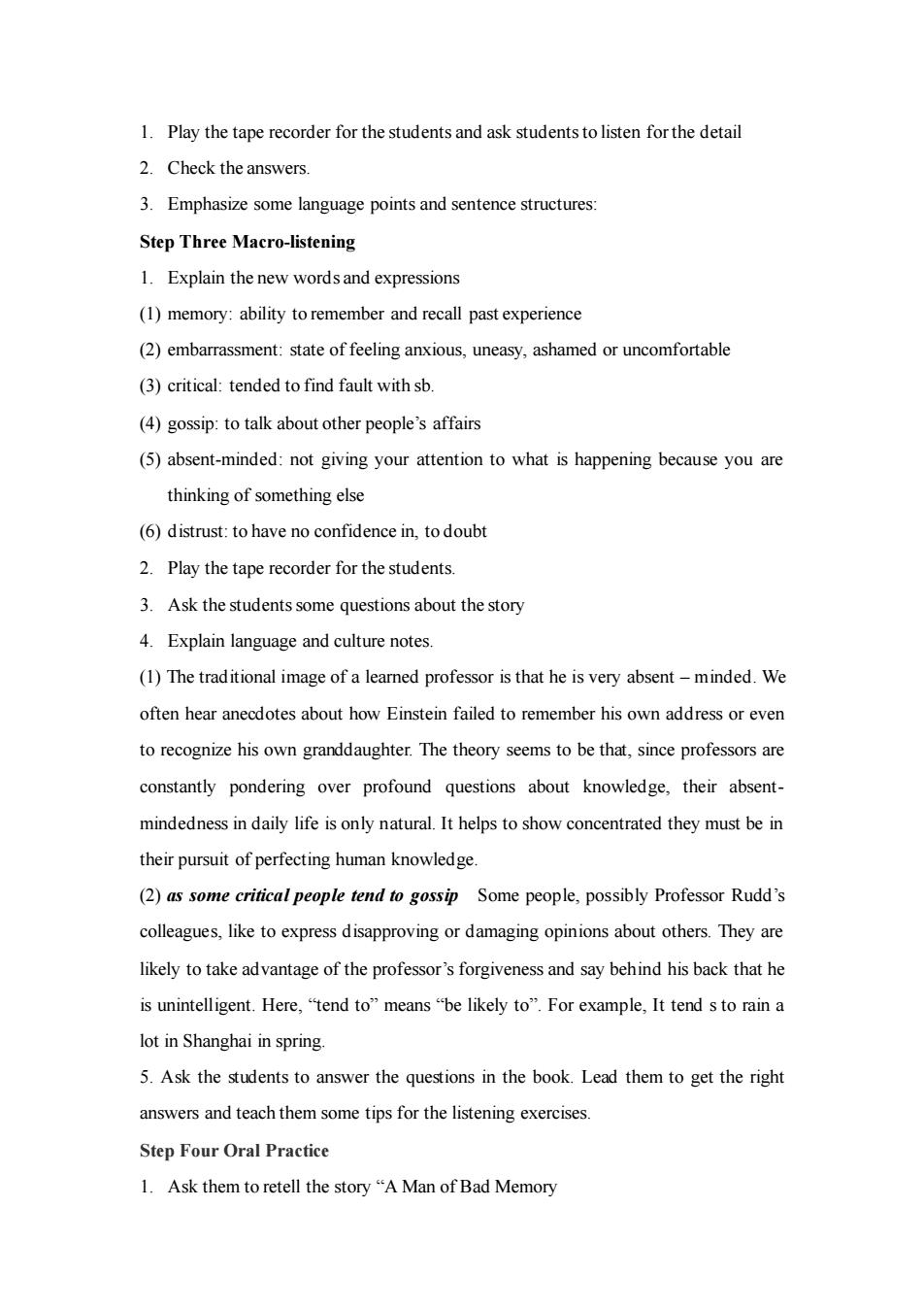正在加载图片...

1.Play the tape recorder for the students and ask students to listen forthe detail 2.Check the answers. 3.Emphasize some language points and sentence structures Step Three Macro-listening 1.Explain the new wordsand expressions (1)memory:ability to remember and recall past experience (2)embarrassment:state of feeling anxious,uneasy,ashamed or uncomfortable ()critical:tended to find fault with sb (4)gossip:to talk about other people's affairs (5)absent-minded:not giving your attention to what is happening because you are thinking of something else (6)distrust:to have no confidence in,todoubt 2.Play the tape recorder for the students. 3.Ask the students some questions about the story 4.Explain language and culture notes. (1)The traditional image of a leamed professor is that he is very absent-minded.We often hear anecdotes about how Einstein failed to remember his own address or even to recognize his own granddaughter.The theory seems to be that,since professors are constantly pondering over profound questions about knowledge,their absent- mindedness in daily life is only natural.It helps to show concentrated they must be in their pursuit of perfecting human knowledge (2)as some critical people tend to gossip Some people,possibly Professor Rudd's colleagues.like to express disapproving or damaging opinions about others.They are likely to take advantage of the professor's forgiveness and say behind his back that he is unintelligent.Here,"tend to"means"be likely to".For example,It tend s to rain a lot in Shanghai in spring. 5.Ask the students to answer the questions in the book.Lead them to get the right answers and teach them some tips for the listening exercises Step Four Oral Practice 1.Ask them to retell the story"A Man of Bad Memory 1. Play the tape recorder for the students and ask students to listen for the detail 2. Check the answers. 3. Emphasize some language points and sentence structures: Step Three Macro-listening 1. Explain the new words and expressions (1) memory: ability to remember and recall past experience (2) embarrassment: state of feeling anxious, uneasy, ashamed or uncomfortable (3) critical: tended to find fault with sb. (4) gossip: to talk about other people’s affairs (5) absent-minded: not giving your attention to what is happening because you are thinking of something else (6) distrust: to have no confidence in, to doubt 2. Play the tape recorder for the students. 3. Ask the students some questions about the story 4. Explain language and culture notes. (1) The traditional image of a learned professor is that he is very absent – minded. We often hear anecdotes about how Einstein failed to remember his own address or even to recognize his own granddaughter. The theory seems to be that, since professors are constantly pondering over profound questions about knowledge, their absentmindedness in daily life is only natural. It helps to show concentrated they must be in their pursuit of perfecting human knowledge. (2) as some critical people tend to gossip Some people, possibly Professor Rudd’s colleagues, like to express disapproving or damaging opinions about others. They are likely to take advantage of the professor’s forgiveness and say behind his back that he is unintelligent. Here, “tend to” means “be likely to”. For example, It tend s to rain a lot in Shanghai in spring. 5. Ask the students to answer the questions in the book. Lead them to get the right answers and teach them some tips for the listening exercises. Step Four Oral Practice 1. Ask them to retell the story “A Man of Bad Memory